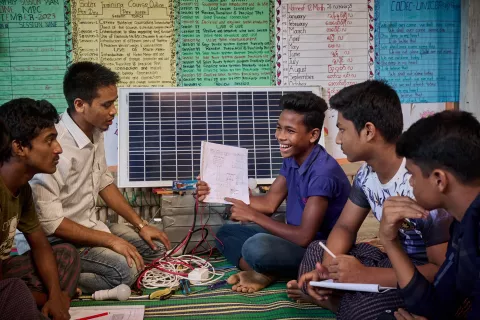Pandemic-induced poverty pushing up child marriage
Reported cases of child marriage received by the Child Helpline 1098 increase

On June 4, 2020, the Child Helpline 1098 phone rang. At the other end of the line was a desperate 16-year-old girl, Labonno (not her real name), from Cumilla district, beseeching the child helpline staff to rescue her from an impending child marriage.
With a trembling voice, she informed the child helpline that the local villagers tried to stop her marriage but failed, which propelled her to seek the helpline team’s support.
The helpline is supported by UNICEF as a part of larger child protection system strengthening programme and operates under the Department of Social Services of the Government of Bangladesh.
Upon verifying the information provided by Labonno, the 1098 team immediately informed the social services officer about the incident. He told them that he will notify the Upazila (sub-district) Executive Officer and take necessary steps to stop the marriage.
Later, with the coordinated efforts of the Executive Officer, the social services officer and the local chairman, the wedding bid was foiled, and they counselled Labonno’s father on the drawbacks of child marriage.
In Labonno’s five-member family, her father is the only earning member, working as a shopkeeper at a grocery store. During the lockdown due to COVID-19, his income dropped. The family was experiencing very hard times.
Labonno passed the eleventh-grade national exams with very good marks this year. Upon counselling from 1098, her father realised how a child marriage will negatively impact his daughter’s future. Moreover, he understood that he could not have improved his financial condition by marrying his daughter off. Instead, an educated daughter will become a future asset rather than a burden to the family.
In the end, Labonno’s father signed an agreement promising that he will not get his daughter married off until she reaches 18 years of age. He also said that he would try to continue Labonno’s education, and the social services officer promised to support her education in all ways possible.
According to findings from the 2019 Multiple Indicator Cluster Survey, conducted by Bangladesh Bureau of Statistics with the support of UNICEF, child marriage still remains widely accepted with 51.4 per cent of women aged 20-24 years first married before their 18th birthday, and 15.5 per cent of women first married before their 15th birthday. The high rate of child marriage continues to cast a negative spell on the educational and physical wellbeing of girl children in Bangladesh, inhibiting their potential for future growth.
Increased call traffic registered with 1098
“Going by the number of pleas received from adolescent girls and community members to stop child marriages, we see an increasing trend in attempted child marriages in recent times as opposed to pre-pandemic days,” says Chowdhury Md. Mohaimen, Manager, Bangladesh Child Helpline 1098, Ministry of Social Welfare.
The reported cases of child marriages received by the child helpline have gone up considerably during the pandemic period, he says, adding that in April 2020 the helpline received 450 calls linked to child marriage whereas the number was 322 in the previous month. This upward trend is continuing, he explains.
“Going by the number of pleas received from adolescent girls and community members to stop child marriages, we see an increasing trend in attempted child marriages in recent times as opposed to pre-pandemic days.”
Mainly attributing income poverty of the daily wage labourers as a reason for this trend, he also holds geographical displacement (as many people moved from cities to villages since April 2020 being unable to cope with the urban living costs) and lack of general awareness responsible for the spike in reported incidents of child marriage.
Floods and COVID-19 pandemic increase risks
While much of the government administration’s attention is dedicated to tackling the onslaught of the countrywide floods and the persisting COVID-19 situation, some guardians are trying to arrange marriages of their minor daughters quietly, according to child helpline officials.
Sixteen-year-old, Surma (not her real name), whose marriage had already been stopped once by the helpline, called again for help when her family used the COVID-19 lockdown to arrange a wedding out of sight. Though officials arrived to intervene, the family again promised to stop the wedding. But after the officials left their house at around 11 o’clock at night, Surma’s family went through with the wedding at two in the morning. Having already spent a great deal of money on the wedding, the family was under financial pressure go through with the wedding.
Reacting to whether income poverty was pushing up child marriage, UNICEF Bangladesh Chief of Child Protection Natalie McCauley, says: “Poverty is definitely one of the dominant triggering factors in child marriage. However, we are yet to come across conclusive data as regards the actual extent of income poverty due to COVID-19.”
“Nevertheless, some innovative incentives should be introduced sooner than later for families whose incomes have plummeted due to the impact of the pandemic. We also need to continue to strengthen and expand the social service workforce to ensure the most vulnerable and at-risk families get access to the services and supports they need,”she adds.



